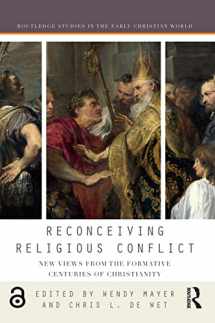
Reconceiving Religious Conflict: New Views from the Formative Centuries of Christianity (Routledge Studies in the Early Christian World)
Book details
Summary
Description
Reconceiving Religious Conflict deconstructs instances of religious conflict within the formative centuries of Christianity, the first six centuries CE. It explores the theoretical foundations of religious conflict; the dynamics of religious conflict within the context of persecution and martyrdom; the social and moral intersections that undergird the phenomenon of religious conflict; and the relationship between religious conflict and religious identity. It is unique in that it does not solely focus on religious violence as it is physically manifested, but on religious conflict (and tolerance), looking too at dynamics of religious discourse and practice that often precede and accompany overt religious violence.


We would LOVE it if you could help us and other readers by reviewing the book
Book review



